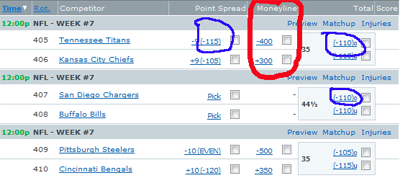Money Line: The
sports betting term "Money line" explained
At the Online Gambling Paper we always stride in helping
bettors by explaining the basic sports betting terminology in
the simplest way possible. Here we will look at the term "money
line", its variations, mistaken meanings and more. As usual
examples will be provided to help you better understand what
money line means in sports betting. So let's begin without
wasting any more time.
The term "money line" will be seen in sports
betting mostly in the United States and it's often referred to
as "American odds" (although this is a mistake, read last
paragraph). It usually takes the form of a plus "+" or minus "-"
sign, followed by a three digit number, for example, -110. The
simplest explanation of the money line term in sports betting is
- the odds on an outright (or straight-up) outcome of a game or
other sporting event. This makes money line the best bet for
beginners, since you simply bet on who will win the game,
period. Here is an example, at the online sportsbook
Bookmaker, the money line on the NFL game Broncos @
Patriots is as follows: Denver +145, New England -165. This
means that the money line odds on Denver to win the game,
without any other conditions, such as point spread, straight-up
are +145 and the money line on the Patriots to win the game is
-165. Here would be a great time to explain what these numbers
(or "lines") mean:
Calculating the American odds, or money
line odds, is very simple, although to a foreign or a beginner
bettor it would be a complete gibberish. This is how you
calculate the money line - if there is a plus sign "+" in front
of the number, the number shows how much money you will win for
every $100 you wager, if your bet is a winner. For example, if
the Denver Broncos win the game, you will win $145 for every
$100 wagered, i.e. if you bet $200 you will win $290. And if the
sign if front of the money line odds is minus "-", the number
shows how much you have to bet in order to win $100. Looking at
the above example, if the Patriots win the game you will have to
bet $165 to win $100, i.e. if you bet $165 on the Pats to win
the game and they do, your money will go from $165 to $265 (the
$165 you initially wagered + the $100 won). By looking at the
money line odds you can easily spot the favorite and the
underdog - the favorite team holds money line odds beginning
with minus and the underdog holds odds beginning with plus.
There is one other form the money line odds can take, that being
"EVEN", often posted by the sportsbooks as "EV". This simply
means that you will get paid even money on your bet. For
example, if the money line odds on the Broncos were listed as
"EVEN" you will get $100 for every $100 bet, or $150 for every
$150, etc.
Now that you know how the money line
works in sports betting, here would be the perfect place to
clear a confusion often ran into by people new to betting or to
the American system of betting odds. It's very important to make
a clear distinction between "money line" and just "line". As we
already explained, "money line" is a form of bet, relating to
the straight-up outcome of the game. In this aspect, money line
is similar to "point spread" or "total". On the other side,
"line" is the payout on the bet, i.e. how much you will win if
your bet is a winner. In this regard, "line" is similar to
"odds", the form for calculating payout in the U.K. (fractional)
or "coefficient", the form for calculating payouts in Europe,
also called "decimal". I know it got overly complicated all of a
sudden so let's look at an example once again. The image below
has been taken from the online sportsbook
BodogLife and shows part of their NFL betting sheet.
To show you the difference between "money line" the bet and
"line" the form of calculating the payout, we have circled
"money line" with red and some of the "lines" with blue:

As you can see, the Titans line on the point
spread is -115 or how much you will win if the team covers the
spread, while the money line on the Titians is -400 or how
much you will win if the Titans win the game.
Related Articles and Explanations:
E-mail:
news@ogpaper.com